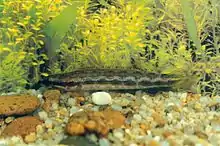| Forest snakehead | |
|---|---|
 | |
| Channa lucius from Mentaya Hulu, Central Kalimantan | |
| Scientific classification | |
| Domain: | Eukaryota |
| Kingdom: | Animalia |
| Phylum: | Chordata |
| Class: | Actinopterygii |
| Order: | Anabantiformes |
| Family: | Channidae |
| Genus: | Channa |
| Species: | C. lucius |
| Binomial name | |
| Channa lucius (G. Cuvier, 1831) | |
| Synonyms[2] | |
| |
The forest snakehead (Channa lucius) is a species of snakehead, a fish of the family Channidae. Its range includes most of Southeast Asia and parts of southern China. It lives in forest streams and can reach 40 cm (16 in) in length.[2] The forest snakehead is known in Thai language as pla krasong (Thai: ปลากระสง).[3] Khmer language called it កញ្ជនជៃ (kanh chon chey), Indonesians named it kehung, while in Malaysia, they called it ikan bujuk in Malay Language and in Vietnamese its name is cá lóc dày
A genetic study published in 2017 indicates that C. lucius is a species complex.[4]
Description

It has a distinct series of port-hole markings on the side and has a more tapering head compared to other snakeheads. Juveniles are pale and have three lateral stripes from head to tail.
References
- ↑ Allen, D.J.; Ng, H.H. (2020). "Channa lucius". IUCN Red List of Threatened Species. 2020: e.T180831A89798655. doi:10.2305/IUCN.UK.2020-2.RLTS.T180831A89798655.en. Retrieved 20 November 2021.
- 1 2 Froese, Rainer; Pauly, Daniel (eds.) (2019). "Channa lucius" in FishBase. January 2019 version.
- ↑ Fishes of Thailand Archived 2013-10-29 at the Wayback Machine (in Thai)
- ↑ Conte-Grand, C., Britz, R., Dahanukar, N., Raghavan, R., Pethi-yagoda, R., Tan, H.H., Hadiaty, R.K., Yaakob, N.S. & Rüber, L. (2017). Barcoding snakeheads (Teleostei, Channidae) re-visited: Discovering greater species diversity and resolving perpetuated taxonomic confusions. PLoS ONE, 12 (9): e0184017.
External links
- "Channa lucius". Integrated Taxonomic Information System. Retrieved 18 April 2006.
